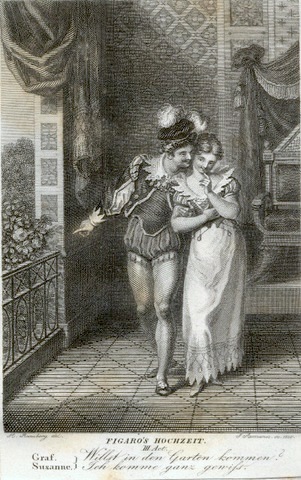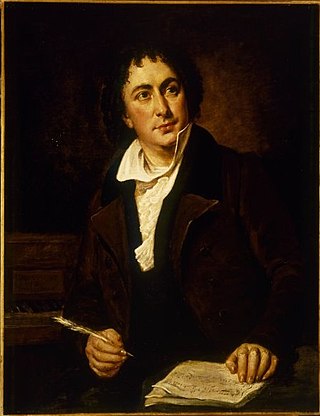
The Marriage of Figaro, K. 492, is a commedia per musica in four acts composed in 1786 by Wolfgang Amadeus Mozart, with an Italian libretto written by Lorenzo Da Ponte. It premiered at the Burgtheater in Vienna on 1 May 1786. The opera's libretto is based on the 1784 stage comedy by Pierre Beaumarchais, La folle journée, ou le Mariage de Figaro. It tells how the servants Figaro and Susanna succeed in getting married, foiling the efforts of their philandering employer Count Almaviva to seduce Susanna and teaching him a lesson in fidelity.

Don Carlos is a five-act grand opera composed by Giuseppe Verdi to a French-language libretto by Joseph Méry and Camille du Locle, based on the dramatic play Don Karlos, Infant von Spanien by Friedrich Schiller. In addition, several incidents, of which the Forest of Fontainebleau scene and auto-da-fé were the most substantial, were borrowed from Eugène Cormon's 1846 play Philippe II, Roi d'Espagne. The opera is most often performed in Italian translation, usually under the title Don Carlo.

Don Pasquale is an opera buffa, or comic opera, in three acts by Gaetano Donizetti with an Italian libretto completed largely by Giovanni Ruffini as well as the composer. It was based on a libretto by Angelo Anelli for Stefano Pavesi's opera Ser Marcantonio written in 1810 but, on the published libretto, the author appears as "M.A."

Josep Maria Carreras Coll, better known as José Carreras, is a Spanish operatic tenor who is particularly known for his performances in the operas of Donizetti, Verdi and Puccini.

Sir Alan Charles MacLaurin Mackerras was an Australian conductor. He was an authority on the operas of Janáček and Mozart, and the comic operas of Gilbert and Sullivan. He was long associated with the English National Opera and Welsh National Opera and was the first Australian chief conductor of the Sydney Symphony Orchestra. He also specialized in Czech music as a whole, producing many recordings for the Czech label Supraphon.

Alceste, Wq. 37, is an opera by Christoph Willibald Gluck from 1767. The libretto was written by Ranieri de' Calzabigi and based on the play Alcestis by Euripides. The premiere took place on 26 December 1767 at the Burgtheater in Vienna.

Jean-François Casimir Delavigne was a French poet and dramatist.

Don John of Austria was the illegitimate son of Charles V, Holy Roman Emperor. Charles V met his son only once, recognizing him in a codicil to his will. John became a military leader in the service of his half-brother, King Philip II of Spain, Charles V's heir, and is best known for his role as the admiral of the Holy League fleet at the Battle of Lepanto.
Sir Simon Keenlyside is a British baritone who has performed in operas and concerts since the mid-1980s.

Isaac Nathan was an English composer, musicologist, journalist and self-publicist, who has been called the "father of Australian music".

Michael Schade is a Canadian operatic tenor, who was born in Geneva and raised in Germany and Canada. He and his wife Dee McKee, and their youngest child live in Vienna, Austria; the rest of the family lives in Canada.
Sydney Philharmonia Choirs is Australia’s largest choral organisation. It presents its own annual concert series in the Sydney Opera House the City Recital Hall, and other venues in New South Wales, as well as serving as chorus for the Sydney Symphony Orchestra.

Il viaggio a Reims, ossia L'albergo del giglio d'oro is an operatic dramma giocoso, originally performed in three acts, by Gioachino Rossini to an Italian libretto by Luigi Balocchi, based in part on Corinne ou l'Italie by Germaine de Staël.

Cheryl Ruth Barker is an Australian operatic soprano who has had an active international career since the late 1980s. She has sung on several complete opera recordings with Chandos Records, including the title roles in Dvořák's Rusalka, Janáček's Káťa Kabanová and Puccini's Madama Butterfly, and Emilia Marty in Janáček's The Makropulos Case. She has also made two solo recordings of opera arias, one with the London Philharmonic Orchestra under conductor David Parry and the other with Orchestra Victoria and conductor Richard Bonynge. On the stage she has had partnerships with the English National Opera (ENO) and Opera Australia.

Susan Elizabeth Futral is an American coloratura soprano who has won acclaim throughout the United States as well as in Europe, South America, and Japan.
Jon Weymouth Weaving was an Australian opera singer, initially a bass-baritone but later a tenor.
Mark Grey is an American classical music composer, sound designer and sound engineer.
Lauris Margaret Elms is an Australian retired contralto, renowned for her roles in opera and lieder and as a recording artist.
(Andrew) Alexander Briger AO is an Australian classical conductor. He is the nephew of the conductor Sir Charles Mackerras, and both are descended from the composer Isaac Nathan.
Australian World Orchestra (AWO) is a symphony orchestra based in Australia.











